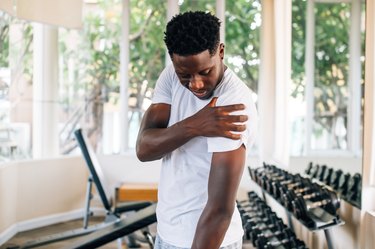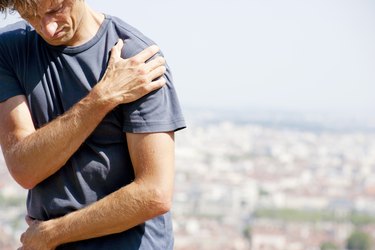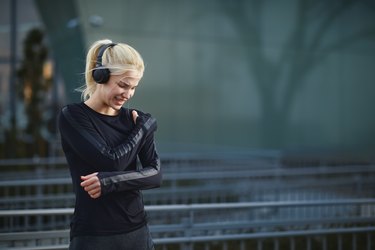
Do you ever notice your shoulder clicking, cracking, popping or grinding during your workouts? If so, you're experiencing crepitus. This strange-sounding word refers to a condition that encompasses any abnormal noise a joint makes during movement. It might be loud or faint, chronic or temporary, painful or pain-free.
But no matter the specifics, it's worth knowing what causes your shoulder to crack and pop during workouts. "A problem can't be solved unless you know exactly what's causing it," says Alejandro Badia, MD, founder of OrthoNOW, "and the key here is early diagnosis."
Video of the Day
Video of the Day
Should I See a Doctor When My Shoulder Pops?
As a symptom, shoulder crepitus isn't inherently dangerous or problematic. Many people experience shoulder clicking or cracking without any pain, and it's often the case that your shoulder muscles, ligaments, tendons and bones are all working together just fine even if they make noise. Such is the case when you crack your knuckles or twist your back.
However, if you experience any sort of pain along with unusual sounds, it could be a sign of injury. If the pain isn't severe, you can try at-home treatments like cold compresses, compression sleeves or simply resting. And make sure you're always doing dynamic shoulder stretches before working out and static stretches at the end.
If the pain persists or gets worse, you should definitely see a doctor. Leaving injuries untreated can result in serious shoulder complications, including the need for surgery or a permanent limitation of mobility.
8 Potential Causes of Shoulders Popping, Cracking or Clicking
That said, here are eight common reasons your shoulder might click, pop, crack or grind during a workout.
1. Your Shoulder Joint Is Subluxing
A shoulder subluxation refers to a partial dislocation of your shoulder joint, which can occur for a variety of reasons. It happens when the ball of your upper arm bone (your humerus) partly detaches from the glenoid socket of your shoulder. You may feel a tingling sensation, warmth or pain in addition to shoulder crepitus. A "catching" sensation is also common, especially with overhead movements.
Fix it: See a physical therapist. For a partial shoulder dislocation, you probably won't need surgery, but you may need a "closed reduction," during which a doctor tries to gently guide your humerus back into the socket. You may also need continued rehabilitation to restore shoulder strength, mobility and stability.
2. Your Ligaments Are Loose
Your ligaments connect bone to bone and essentially keep your skeleton stable. Most people experience tight ligaments from lack of physical activity and stretching, but some people have loose ligaments. When ligaments become loose, they can cause pain and abnormal joint noise.
The official name of this condition is ligamentous laxity, but you may have heard people say "double-jointed" or "joint laxity."
"People use the term double jointed, which does not exist," says Dr. Badia. "Ligamentous laxity is a term describing people who have extremely loose joints, where essentially they have long ligaments and the shoulder can become painful from this condition."
Fix it: See a physical therapist. Loose ligaments can be treated with proper rehabilitation, Dr. Badia says, as most of the time, this condition doesn't do well with surgical stabilization.
3. Your Shoulder Is Releasing Gas
Not in the intestinal sense, but gas does build up in your joints, eventually needing to be released. This phenomenon, sometimes called cavitation, is harmless and usually painless and occurs due to the release of various gases from synovial fluid, the lubrication that your body creates to keep your joints mobile.
Synovial fluid contains oxygen, nitrogen and carbon dioxide, all of which could be responsible for the cracking and popping — it's what happens when you crack your knuckles.
Fix it: Let it happen! As long as you don't feel any pain, your shoulder is probably operating fine. And no, cracking your knuckles will not cause arthritis.
4. You Have a Labral Tear or Rotator Cuff Tear
Two of the most common shoulder injuries — labral tears and rotator cuff tears — can both cause shoulder cracking. In many of these cases, the sound more closely resembles a grind.
Labral tears involve injury to the rubbery disc of cartilage in your shoulder socket, which cushions the top of your upper arm bone (humerus). Rotator cuff tears involve injury to any of the four muscles or any of the tendons that keep your humerus secure in your shoulder socket.
Fix it: See an orthopedic specialist. Rotator cuff tears and labral tears are both serious injuries that can result in permanent damage if left untreated.
5. Tight Muscles Are Causing Tendons to Run Over Bone
If you work out a lot, you may experience tight muscles or muscle knots. When your muscles get super contracted, they may restrict the range of motion of your shoulder joint and cause inner structures to rub against one another.
Fix it: Stretching, foam rolling, massage, heat therapy and cold therapy can help relax tight muscles. Also, taking a couple of rest days can give tight muscles time to recover and help you avoid chronic tightness.
"Using a heating pad, preferably moist heat, will help before a workout in order to improve blood supply to the area and will often diminish some of these clicking and popping issues," Dr. Badia says. "After a workout, ice should be used. If the symptoms continue despite rest and hot-cold treatment, evaluation by the appropriate specialist is by far the most efficient manner to obtain a solution."
6. Bursitis or Tendinitis Is Causing Inflammation
Bursitis and tendinitis are two common inflammatory conditions that can affect any joint. Both are often referred to as "shoulder impingement."
Bursitis refers to inflammation of a bursa, a fluid-filled sac that helps to cushion joints and reduce friction between different tissues of your body. When a shoulder bursa becomes inflamed, space within the shoulder joint decreases and can cause friction, which may lead to pain and clicking.
Shoulder tendinitis, on the other hand, is inflammation of a tendon, typically of the rotator cuff or biceps. While the source of inflammation differs, the result is the same: decreased space within your shoulder joint, which can lead to rubbing, pain and clicking.
Fix it: You may be able to reduce symptoms of shoulder bursitis and tendinitis at home with anti-inflammatory pain medications, ice and rest. But if your symptoms persist, you should see a doctor, Dr. Badia says, as a magnetic resonance imaging (MRI) is the best way to get a diagnosis.
7. Osteoarthritis Is Causing Bones to Rub Together
As you get older, the cartilage between your joints begins to degenerate, decreasing the space between your bones. If your bones rub together, they may cause a cracking or grinding sound, both of which can be early signs of arthritis.
Fix it: Talk to your doctor if you suspect you have arthritis. Most doctors recommend lifestyle adjustments for arthritis, including avoiding certain activities (or adding certain other low-impact activities), stretching affected areas and applying heat and ice. Your doctor may also prescribe medication to help with pain.
8. It’s Not Actually Your Shoulder
Yep, that's right! That clicking, popping or cracking you think is coming from your shoulder may actually originate from structures near your shoulders, but not actually your shoulder.
For example, your biceps tendon might be loose or inflamed, your shoulder blades may be rubbing against your ribs and the tendons around your shoulder blades (snapping scapula syndrome) or your pectoral muscles are too tight.
Fix it: If you suspect that your shoulder joint sounds aren't actually coming from your shoulder, it's best to see a doctor who can determine the root cause.
- Science Direct: Crepitus - an overview
- Pubmed: Shoulder Subluxation
- Cochrane Library: Closed reduction methods for acute anterior shoulder dislocation
- PLoS One: Real-Time Visualization of Joint Cavitation
- The Journal of Family Practice: Clinical Inquiry: Does knuckle popping lead to arthritis?
- Pubmed: Superior Labrum Anterior Posterior (SLAP) Lesions
- Current Review of Musculoskeletal Medicine: Evaluation and Management of Rotator Cuff Tears: a Primary Care Perspective
- PM&R: Myofascial Trigger Points Then and Now: A Historical and Scientific Perspective
- Sports Medicine: Acute Effects of Dynamic Stretching on Muscle Flexibility and Performance: An Analysis of the Current Literature.
- Sports Medicine: The mechanisms of massage and effects on performance, muscle recovery and injury prevention.
- BMC Musculoskeletal Disorders: The immediate effect of muscle release intervention on muscle activity and shoulder kinematics in patients with frozen shoulder: a cross-sectional, exploratory study
- Cedars-Sinai: Bursitis of the Shoulder
- Pubmed: Rotator Cuff Tendonitis
- OrthoInfo: Biceps Tendinitis
- Muscle, Ligaments, Tendons Journal: Snapping scapula syndrome: current concepts review in conservative and surgical treatment
- Journal of Physical Therapy Science: The effects of shoulder stabilization exercises and pectoralis minor stretching on balance and maximal shoulder muscle strength of healthy young adults with round shoulder posture
Was this article helpful?
150 Characters Max
0/150
Thank you for sharing!
Thank you for your feedback!
Is this an emergency? If you are experiencing serious medical symptoms, please see the National Library of Medicine’s list of signs you need emergency medical attention or call 911.


